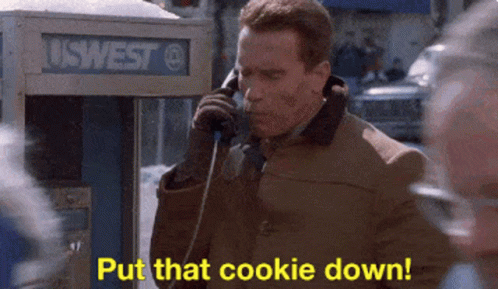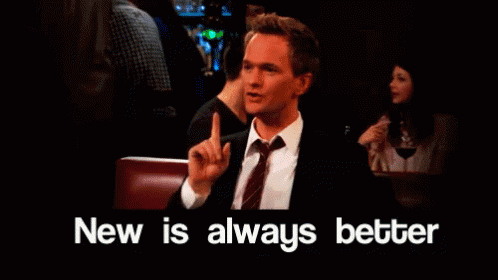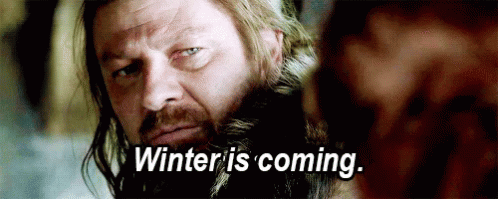Winter Is Coming
The craving we have for constant change is a bit like chewing gum that's already been chewed.

This week's newsletter is sponsored by Game of Thrones because I can't resist making Winter Is Coming references as soon as the weather gets colder. It's nice not having to run my air conditioner the entire day, but the real perk of colder weather is that I can wear my hoodies again. The downside of autumn is that I get a little sniffly, mostly because I don't remember how cold 53 degrees and drizzly feels.
Just call me Jon Snow, because I know nothing.
I'm always excited as the calendar flips into October because I can wear hoodies again, and the sun setting earlier makes me feel better about sleeping at 9 PM. But also, the lunar month of Kartik usually starts during October (this year, from October 9th to November 6th). Spiritual practitioners in my tradition typically spend the month of Kartik withdrawing from the world, preferring to dedicate this month to deepening their inner world. The changing weather also facilitates this: nothing feels better than staying in when it becomes cold outside.
Kartik is special for many reasons (the festival of Diwali marks the halfway point of the month), but one thing that's done in Kartik is taking on a voluntary austerity for the month. Similar to the practices of Christians during the month of Lent, people will frequently give up eating certain foods, giving up certain habits, or performing some special services.
The thing about doing these things you wouldn't normally do is that it takes a great deal of preparation. It's not just externally by throwing out the Oreos, but also internally preparing to avoid munching on Oreos for the whole month. This preparation is half the battle; we can't change our habits if we don't change our mindset.
What we want to change is pretty easy to identify. Most of us can easily pick out the areas of our life that we wish were different, whether that means more or less attention is given to that area of our life. How we change is trickier but still relatively straightforward, but that takes a little preparation. If I want to quit snacking on Oreos, I need to make sure there aren't any Oreos in the house and have something to tell myself when I see the cookies in a vending machine at 1 AM.

The external preparation for a voluntary austerity is the simple part, but it's also crucial to our internal preparation. Internal preparation is the difficult part because that's what dictates our thoughts (and, therefore, our actions) when we are exposed to the stimuli that trigger what we want to change. I always want to go deeper, so this got me thinking: why do we change?
In one sense, change is the only constant. It's a force of nature that can't be stopped, found in the ebbs and flows of the tide, the phases of the moon, or the rising and setting of the sun. As the Greek philosopher, Heraclitus once said, "You can't step into the same river twice." Seemingly the only thing that doesn't change is human nature.
Human nature is one of those things that's riddled philosophers and thinkers of every era, with heavyweights such as Aristotle, Darwin, and Freud all chiming in with their thoughts. But human nature, among other things, is searching for change and variety. That's why change is such an aspirational thing, found in the speeches of political leaders and every marketing campaign.
The craving we have for constant change is a bit like chewing gum that's already been chewed. In search of change and variety, we constantly reinvent ourselves and the things around us. The capitalist model of the world is based on the idea that "New is always better," but we end up repeating the same experiences over and over again: meet the new boss, the same as the old boss.

The answer to the question, "why do we change" given by the wisdom texts of the East is predicated on the reason for existence: desire. Simply put, we change when we want to change.
The most impactful changes come from the deepest desires. As winter approaches, the bear hibernates, the squirrels hide their acorns, and the trees drop their leaves. This is not because they have superficial desires, as we do for the latest iPhone, but because those desires come from the core of their being. These desires are so deep we just call them "instinct."
As humans, we naturally have the desires and instincts that correspond to human bodies: the needs for warmth, shelter, food, relationships, etc. But is it possible to change those desires? We may not be able to change our desire for food, shelter, or relationships, but we can alter how those desires manifest. Rather than indulging my desire for food through Oreos and mozzarella sticks, I can gradually work towards indulging through kale and granola bars.
While at the present moment, I can't see myself ever wanting to fill my belly with kale and granola, the important thing to note here is that it's a gradual process. I'm not going to be able to shed my attraction to Oreos overnight, but over time with my own effort, I may be able to appreciate kale more. However, more important than my own efforts are the instructions of others. I can't possibly hope to figure out how to make kale and granola taste good on my own; I'm going to need a recipe from someone who already has the secret to making them taste good.
Preparing for winter means listening to others who know what winter brings and bundling up myself. But I first have to want to prepare for winter, and that's where my own efforts and the instructions of others come in. These two things are the secret to cultivating deep desires for lasting change.

Happy that we still get a few weeks of autumn,
-Sid




